VATICAN CITY, 19 OCT 2011 (VIS) –
Some 20,000 pilgrims attended Benedict XVI’s general audience, which was held this morning in St. Peter’s Square. Continuing a series of catecheses dedicated to the Psalms, the Holy Father focused his attention on Psalm 136, “a great hymn of praise which celebrates the Lord in the many and repeated manifestations of His goodness down human history”.
The Pope explained how, in Jewish tradition, this Psalm is sung at the end of the Passover supper, and therefore it was probably also pronounced by Jesus at the last Passover He celebrated with His disciples. The text enumerates God’s many interventions in favour of His people “and each proclamation of a salvific action by the Lord is answered by an antiphon reiterating the main cause for praise: God’s eternal love, a love which, according to the Hebrew term used, implies faithfulness, mercy, goodness, grace and tenderness”.
God is first presented as “He Who ‘does great wonders’, first among them that of the creation: heaven, earth and stars. … With the creation the Lord shows Himself in all His goodness and beauty. He commits Himself to life, revealing a desire for good whence all other salvific actions arise”.
The Psalm goes on to consider God’s manifestations in history, evoking the great moment when the Israelites were freed from slavery in Egypt. The forty years of wandering in the desert were “a decisive period for Israel which, allowing itself to be guided by the Lord, learned to live on faith, obedient and docile to the laws of God. Those were difficult years, marked by the harshness of life in the desert, but also a happy time of confidence and filial trust in the Lord”.
“The history of Israel has known exhilarating moments of joy, of fullness of life, of awareness of the presence of God and His salvation”, said the Pope. “But it has also been marked by episodes of sin, painful periods of darkness and profound affliction. Many were the adversaries from whom the Lord liberated His people”. The Psalm speaks of these events, in particular the Babylonian exile and the destruction of Jerusalem, “when it seemed that Israel had lost everything, even its own identity, even its trust in the Lord. However, God remembers, and frees. The salvation of Israel and of all mankind is bound to the Lord’s faithfulness, to His memory. While man forgets easily, God remains faithful: His memory is a precious casket containing that ‘love which endures forever’ about which our Psalm speaks”.
The Psalm concludes by reminding us that God feeds His creatures, “caring for life and giving
bread. … In the fullness of time the Son of God became man to give life, for the salvation of each one of us; and He continues to gives Himself as bread in the mystery of the Eucharist, so as to draw us into His covenant, which makes us children. So great is God’s merciful goodness, the sublimity of His ‘love which endures forever'”. In conclusion the Pope read a quote from the First Letter of St. John, advising the faithful to bear it in mind in their prayers: “See what love the Father has given us, that that we should be called children of God; and that is what we are”.
AG/ VIS 20111019 (560)
raise the Lord, for he is good: for his mercy endures for ever.
2 Praise the God of gods: for his mercy endures for ever.
3 Praise the Lord of lords: for his mercy endures for ever.
4 Who alone does great wonders: for his mercy endures for ever.
5 Who made the heavens in understanding: for his mercy endures for ever.
6 Who established the earth above the waters: for his mercy endures for ever.
7 Who made the great lights: for his mercy endures for ever.
8 The sun to rule the day: for his mercy endures for ever.
9 The moon and the stars to rule the night: for his mercy endures for ever.
10 Who smote Egypt with their firstborn: for his mercy endures for ever.
11 Who brought out Israel from among them: for his mercy endures for ever.
12 With a mighty hand and with a stretched out arm: for his mercy endures for ever.
13 Who divided the Red Sea into parts: for his mercy endures for ever.
14 And brought out Israel through the midst thereof: for his mercy endures for ever.
15 And overthrew Pharao and his host in the Red Sea: for his mercy endures for ever.
16 Who led his people through the desert: for his mercy endures for ever.
17 Who smote great kings: for his mercy endures for ever.
18 And slew strong kings: for his mercy endures for ever.
19 Sehon king of the Amorrhites: for his mercy endures for ever.
20 And Og king of Basan: for his mercy endures for ever.
21 And he gave their land for an inheritance: for his mercy endures for ever.
22 For an inheritance to his servant Israel: for his mercy endures for ever.
23 For he was mindful of us in our affliction: for his mercy endures for ever.
24 And he redeemed us from our enemies: for his mercy endures for ever.
25 Who gives food to all flesh: for his mercy endures for ever.
26 Give glory to the God of heaven: for his mercy endures for ever. Give glory to the Lord of lords: for his mercy endures for ever.
prayer
A Prayer to Our Lady composed by Fr. Jerzy Popieluszko – Discerning Hearts
Mother of those who place their hope in Solidarity, pray for us.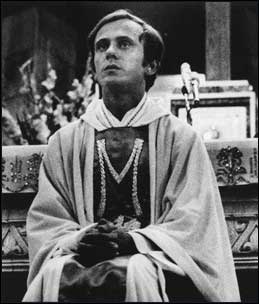
Mother of those who are deceived, pray for us.
Mother of those who are betrayed, pray for us.
Mother of those who are arrested in the night, pray for us.
Mother of those who are imprisoned, pray for us.
Mother of those who suffer from the cold, pray for us.
Mother of those who have been frightened, pray for us.
Mother of those who were subjected to interrogations, pray for us.
Mother of those innocents who have been condemned, pray for us.
Mother of those who speak the truth, pray for us.
Mother of those who cannot be corrupted, pray for us.
Mother of those who resist, pray for us.
Mother of orphans, pray for us.
Mother of those who have been molested because they wore your image, pray for us.
Mother of those who are forced to sign declarations contrary to their conscience, pray for us.
Mother of mothers who weep, pray for us.
Mother of fathers who have been so deeply saddened, pray for us.
Mother of our suffering country _____, pray for us.
Mother of our faithful country _____, pray for us.
We beg you, O mother in whom resides the hope of millions of people, grant us to live in liberty and in truth, in fidelity to you and to your Son. Amen.
St. Gerard Majella…a son of true humility, demonstrating what it truly means to be little, silent and obedient to the will of God – Discerning Hearts
A Prayer to Gerard Majella
Saint Gerard Majella April 6, 1726, Muro Lucano, Basilicata – October 16, 1755, He is the saint whose intercession is requested for children (and unborn children in particular), childbirth, mothers (and expectant mothers in particular), motherhood, falsely accused people, good confessions, lay brothers and just about anyone who desires the comfort of an understanding heart.
When he was born, he was given the name Gerard. He was the son of a tailor who died when Gerard was twelve, leaving the family in poverty. His mother then sent him to her brother so that he could teach Gerard how to sew and help the business. During this time, he was abused by a man whom his uncle sent to help him. He kept silent, but soon his uncle found out and the man who taught him resigned from the job. He loved to be like Jesus Crucified and tried at all costs to suffer. . He joined the Congregation of the Most Holy Redeemer in 1749. When falsely accused by a pregnant woman of being the father of her child, he retreated to silence. She later recanted and cleared him, and thus began his association as patron of all aspects of pregnancy. He was reputed to have bilocation and read consciences. His last will consisted of a small note on the door of his cell saying, “Here the will of God is done, as God wills, and as long as God wills.“ He died on October 16, 1755 in Caposele of tuberculosis, aged 29.
This very short synposis of his life does not do him justice, for more details of his life and so much more visit the website of the Redemptorists.
I found the best way to really know St. Gerard is to pray with him. For a fuller listing of prayers and a novena to St. Gerard visit his Discerning Hearts page
Saint Gerard Prayers –
For Motherhood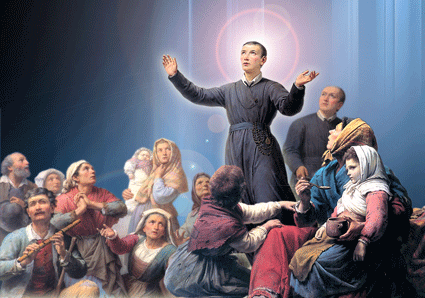
O good Saint Gerard, powerful intercessor before God and Wonderworker of our day, I call upon thee and seek thy aid. Thou who on earth didst always fulfill God’s designs, help me to do the holy Will of God. Beseech the Master of Life, from Whom all paternity proceedeth, to render me fruitful in offspring, that I may raise up children to God in this life and heirs to the Kingdom of His Glory in the world to come. Amen.
For Mother with Child
O almighty and Everlasting God Who through the operation of the Holy Christ, didst prepare the body and soul of the glorious Virgin Mary to be a worthy dwelling place of Thy divine Son; and, through the operation of the same Holy Ghost, didst sanctify Saint John the Baptist, while still in his mother’s womb; hearken to the prayers of Thy humble servant who implore thee, through the intercession of Saint Gerard, to protect her (me); that it may be cleansed by the saving water of baptism and, after a Christian life on earth, it may with its mother, attain everlasting bliss in Heaven. Amen.
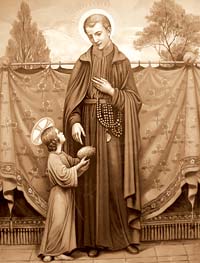 For a Sick Child
For a Sick Child
O Saint Gerard, who, like the Savior, loved children so tenderly and by your prayers freed many from disease and even from death; graciously look down upon the distressed parents who plead with thee for their child’s health if such be the Will, of God. Present their promise to God to bring up the child a good Christian and to guard it by word and example against the fatal leprosy of sin. This favor we implore thee, O sainted Brother, through the tender love with which Jesus and Mary blessed thy own innocent childhood. Amen.
In Time of Trial
O Sainted Brother Gerard, whose heart went out to the unfortunate; who relieved so many poor, healed so many sick, comforted so many afflicted; behold me worried and troubled as I kneel at thy feet. In vain to turn to men to seek consolation and help; therefore, do I have recourse to thee thou who art so powerful in heaven. Graciously assist me, Saint Gerard, that being freed from this trial or strengthened to bear it for the love of God, I may praise and thank God and serve Him with greater love and fervor. Amen.
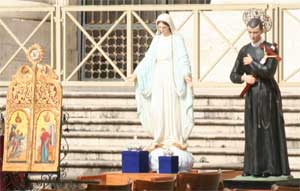 When in Rome, during the Wednesday audience, we saw them bring out a statue of St. Gerard to be blessed by our Holy Father, Pope Benedict. Of course, it would be blessed along with an image of Our Lady. I am sure wherever this statue is now, there are many candles lit requesting this wonderful saints intercession. May all their prayers be answered. St. Gerard Majella, pray for us.
When in Rome, during the Wednesday audience, we saw them bring out a statue of St. Gerard to be blessed by our Holy Father, Pope Benedict. Of course, it would be blessed along with an image of Our Lady. I am sure wherever this statue is now, there are many candles lit requesting this wonderful saints intercession. May all their prayers be answered. St. Gerard Majella, pray for us.
St. Gerard Majella…a son of true humility, demonstrating what it truly means to be little, silent and obedient to the will of God
A Prayer to Gerard Majella
Saint Gerard Majella April 6, 1726, Muro Lucano, Basilicata – October 16, 1755, He is the saint whose intercession is requested for children (and unborn children in particular), childbirth, mothers (and expectant mothers in particular), motherhood, falsely accused people, good confessions, lay brothers and just about anyone who desires the comfort of an understanding heart.
When he was born, he was given the name Gerard. He was the son of a tailor who died when Gerard was twelve, leaving the family in poverty. His mother then sent him to her brother so that he could teach Gerard how to sew and help the business. During this time, he was abused by a man whom his uncle sent to help him. He kept silent, but soon his uncle found out and the man who taught him resigned from the job. He loved to be like Jesus Crucified and tried at all costs to suffer. . He joined the Congregation of the Most Holy Redeemer in 1749. When falsely accused by a pregnant woman of being the father of her child, he retreated to silence. She later recanted and cleared him, and thus began his association as patron of all aspects of pregnancy. He was reputed to have bilocation and read consciences. His last will consisted of a small note on the door of his cell saying, “Here the will of God is done, as God wills, and as long as God wills.“ He died on October 16, 1755 in Caposele of tuberculosis, aged 29.
This very short synposis of his life does not do him justice, for more details of his life and so much more visit the website of the Redemptorists.
I found the best way to really know St. Gerard is to pray with him. For a fuller listing of prayers and a novena to St. Gerard visit his Discerning Hearts page
Saint Gerard Prayers –
For Motherhood
O good Saint Gerard, powerful intercessor before God and Wonderworker of our day, I call upon thee and seek thy aid. Thou who on earth didst always fulfill God’s designs, help me to do the holy Will of God. Beseech the Master of Life, from Whom all paternity proceedeth, to render me fruitful in offspring, that I may raise up children to God in this life and heirs to the Kingdom of His Glory in the world to come. Amen.
For Mother with Child
O almighty and Everlasting God Who through the operation of the Holy Christ, didst prepare the body and soul of the glorious Virgin Mary to be a worthy dwelling place of Thy divine Son; and, through the operation of the same Holy Ghost, didst sanctify Saint John the Baptist, while still in his mother’s womb; hearken to the prayers of Thy humble servant who implore thee, through the intercession of Saint Gerard, to protect her (me); that it may be cleansed by the saving water of baptism and, after a Christian life on earth, it may with its mother, attain everlasting bliss in Heaven. Amen.
 For a Sick Child
For a Sick Child
O Saint Gerard, who, like the Savior, loved children so tenderly and by your prayers freed many from disease and even from death; graciously look down upon the distressed parents who plead with thee for their child’s health if such be the Will, of God. Present their promise to God to bring up the child a good Christian and to guard it by word and example against the fatal leprosy of sin. This favor we implore thee, O sainted Brother, through the tender love with which Jesus and Mary blessed thy own innocent childhood. Amen.
In Time of Trial
O Sainted Brother Gerard, whose heart went out to the unfortunate; who relieved so many poor, healed so many sick, comforted so many afflicted; behold me worried and troubled as I kneel at thy feet. In vain to turn to men to seek consolation and help; therefore, do I have recourse to thee thou who art so powerful in heaven. Graciously assist me, Saint Gerard, that being freed from this trial or strengthened to bear it for the love of God, I may praise and thank God and serve Him with greater love and fervor. Amen.
 When in Rome, during the Wednesday audience, we saw them bring out a statue of St. Gerard to be blessed by our Holy Father, Pope Benedict. Of course, it would be blessed along with an image of Our Lady. I am sure wherever this statue is now, there are many candles lit requesting this wonderful saints intercession. May all their prayers be answered. St. Gerard Majella, pray for us.
When in Rome, during the Wednesday audience, we saw them bring out a statue of St. Gerard to be blessed by our Holy Father, Pope Benedict. Of course, it would be blessed along with an image of Our Lady. I am sure wherever this statue is now, there are many candles lit requesting this wonderful saints intercession. May all their prayers be answered. St. Gerard Majella, pray for us.
Pope Benedict on Prayer 11 – Psalm 126: “May those who sow in tears, reap with shouts of joy”
HUMAN HISTORY IS A HISTORY OF SALVATION – Psalm 126
VATICAN CITY, OCT. 12, 2011 (Zenit.org).- Here is a translation of the Italian-language catechesis Benedict XVI gave today during the general audience held in St. Peter’s Square. The Pope today continued his catecheses on prayer with a reflection on Psalm 126.
* * *
In the previous catecheses, we have meditated on a number of psalms of lament and of trust. Today, I would like to reflect with you on a notably joyous psalm, a prayer that sings with joy the marvels of God. It is Psalm 126 — according to Greco-Latin numbering, 125 — which extols the great things the Lord has done with His people, and which He continues to do with every believer.
The psalmist begins the prayer in the name of all Israel by recalling the thrilling experience of salvation:
“When the Lord restored the fortunes of Zion,
we were like those who dream.
Then our mouth was filled with laughter,
and our tongue with shouts of joy” (Verses 1-2a).
The psalm speaks of “restored fortunes”; that is, restored to their original state in all their former favorability. It begins then with a situation of suffering and of need to which God responds by bringing about salvation and restoring the man who prays to his former condition; indeed, one that is enriched and even changed for the better. This is what happens to Job, when the Lord restores to him all that he had lost, redoubling it and bestowing upon him an even greater blessing (cf. Job 42:10-13), and this is what the people of Israel experience in returning to their homeland after the Babylonian exile.
This psalm is meant to be interpreted with reference to the end of the deportation to a foreign land: The expression “restore the fortunes of Zion” is read and understood by the tradition as a “return of the prisoners of Zion.” In fact, the return from exile is paradigmatic of every divine and saving intervention, since the fall of Jerusalem and the deportation into Babylon were devastating experiences for the Chosen People, not only on the political and social planes, but also and especially on the religious and spiritual ones. The loss of their land, the end of the davidic monarchy and the destruction of the Temple appear as a denial of the divine promises, and the People of the Covenant, dispersed among the pagans, painfully question a God who seems to have abandoned them.
Therefore, the end of the deportation and their return to their homeland are experienced as a marvelous return to faith, to trust, to communion with the Lord; it is a “restoring of fortunes” that involves a conversion of heart, forgiveness, re-found friendship with God, knowledge of His mercy and a renewed possibility of praising Him (cf. Jeremiah 29:12-14; 30:18-20; 33:6-11; Ezekiel 39:25-29). It is an experience of overflowing joy, of laughter and of cries of jubilation, so beautiful that “it seems like a dream.” Divine help often takes surprising forms that surpass what man is able to imagine; hence the wonder and joy that are expressed in this psalm: “The Lord has done great things.” This is what the nations said, and it is what Israel proclaims:
“Then they said among the nations,
‘the Lord has done great things for them.’
The Lord has done great things for us;
we are glad” (Verses 2b-3).
God performs marvelous works in the history of men. In carrying out salvation, He reveals Himself
to all as the powerful and merciful Lord, a refuge for the oppressed, who does not forget the cry of the poor (cf. Psalm 9:10,13), who loves justice and right and of whose love the earth is filled (cf. Psalm 33:5). Thus, standing before the liberation of the People of Israel, all the nations recognize the great and marvelous things God has accomplished for His People, and they celebrate the Lord in His reality as Savior.
And Israel echoes the proclamation of the nations, taking it up and repeating it once more — but as the protagonist — as a direct recipient of the divine action: “The Lord has done great things for us”; “for us” or even more precisely, “with us,” in hebrew ‘immanû, thus affirming that privileged relationship that the Lord keeps with His chosen ones, and which is found in the nameEmmanuel, “God with us,” the name by which Jesus would be called, His complete and full revelation (cf. Matthew 1:23).
Dear brothers and sisters, in our prayer we should look more often at how, in the events of our own lives, the Lord has protected, guided and helped us, and we should praise Him for all He has done and does for us. We should be more attentive to the good things the Lord gives to us. We are always attentive to problems and to difficulties, and we are almost unwilling to perceive that there are beautiful things that come from the Lord. This attention, which becomes gratitude, is very important for us; it creates in us a memory for the good and it helps us also in times of darkness. God accomplishes great things, and whoever experiences this — attentive to the Lord’s goodness with an attentiveness of heart — is filled with joy. The first part of the psalm concludes on this joyous note. To be saved and to return to one’s homeland from exile are like being returned to life: Freedom opens up to laughter, but is does so together with a waiting for a fulfillment still desired and implored. This is the second part of our psalm, which continues:
Our Holy Father has a “spiritual weapon” and he’s not afraid to use it (and he wants all of us to use it too…The Holy Rosary!) – Discerning Hearts
Vatican City, Oct 6, 2010 / 03:54 pm (CNA/EWTN News).- Anticipating Thursday’s celebration of the Feast of Our Lady of the Rosary, the Holy Father called on the faithful to make an effort to rediscover the prayer. He urged Christians to seek intercession, protection and personal encounter with Christ through the “simple but efficient prayer,” especially during the Marian month of October.
Greeting the faithful in 10 different languages during Wednesday’s general audience, the Holy Father spoke of the Rosary as “a particular prayer of the Church and a spiritual weapon for each of us.”
He prayed that the meditation of Jesus and Mary’s life through the Rosary might be, “for all of us, light on the evangelical path of spiritual renewal and conversion of heart.”
Speaking in Portuguese, but referring to all people, he invited families to join together with the Virgin Mary so as to cooperate fully with the salvific designs of God. In Croatian, he said to ask for her intercession and protection for each person and family, exhorting prayers also for vocations to the priesthood and religious life.
In still other languages, 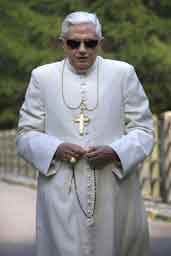 he asked that the faithful “rediscover the value” of the “simple but efficient prayer” of the Rosary “as a way for a personal encounter with Christ.”
he asked that the faithful “rediscover the value” of the “simple but efficient prayer” of the Rosary “as a way for a personal encounter with Christ.”
“October,” he said in the Italian greeting that concluded his public words on Wednesday, “is the month of the Holy Rosary, which invites us to value this prayer so dear to the tradition of the Christian people.”
Addressing some of the special guests at the audience, he said, “I invite you, dear young people, to make of the Rosary your daily prayer. I encourage you, dear sick, to grow, thanks to the recitation of the Rosary, in the trusting abandonment to the hands of God. I exhort you, dear newlyweds, to make of the Rosary a constant contemplation of the mysteries of Christ.” – CNA
Shhhhh….it’s St. Bruno’s Feast day – Discerning Hearts
St. Bruno was one of the most exceptional scholars, teachers, prayer warriors of his time : “…a prudent man whose word was rich in meaning.” I think the key was the gift of great humility. He must have been very close to Our Lady.
: “…a prudent man whose word was rich in meaning.” I think the key was the gift of great humility. He must have been very close to Our Lady.
The Order founded by Bruno — the Carthusians — is one of the strictest in the Church. Carthusians follow the Rule of St. Benedict, but accord it a most austere interpretation; there is perpetual silence and complete abstinence from flesh meat (only bread, legumes, and water are taken for nourishment). Bruno sought to revive the ancient eremitical (hermit) way of life. His Order enjoys the distinction of never becoming unfaithful to the spirit of its founder, never needing a reform.
Quote:
Rejoice, my dearest brothers, because you are blessed and because of the bountiful hand of God’s grace upon you. Rejoice, because you have escaped the various dangers and shipwrecks of the stormy world. Rejoice because you have reached the quiet and safe anchorage of a secret harbor. Many wish to come into this port, and many make great efforts to do so, yet do not achieve it. Indeed many, after reaching it, have been thrust out, since it was not granted them from above. By your work you show what you love and what you know. When you observe true obedience with prudence and enthusiasm, it is clear that you wisely pick the most delightful and nourishing fruit of divine Scripture.
~from a letter by Saint Bruno to the Carthusians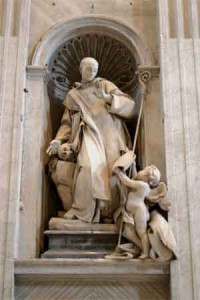
Collect:
Father,
you called St. Bruno to serve you in solitude.
In answer to his prayers
help us to remain faithful to you.
amid the changes of this world.
We ask this through our Lord Jesus Christ, your Son,
who lives and reigns with you and the Holy Spirit,
one God, forever and ever. Amen.
St. Bruno is the patron of diabolic possession. St. Bruno, confessor, ecclesiastical writer, and founder of the Carthusian Order. He was born at Cologne about the year 1030; died October 6, 1101.
Shhhhh….it’s St. Bruno’s Feast day
St. Bruno was one of the most exceptional scholars, teachers, prayer warriors of his time : “…a prudent man whose word was rich in meaning.” I think the key was the gift of great humility. He must have been very close to Our Lady.
: “…a prudent man whose word was rich in meaning.” I think the key was the gift of great humility. He must have been very close to Our Lady.
The Order founded by Bruno — the Carthusians — is one of the strictest in the Church. Carthusians follow the Rule of St. Benedict, but accord it a most austere interpretation; there is perpetual silence and complete abstinence from flesh meat (only bread, legumes, and water are taken for nourishment). Bruno sought to revive the ancient eremitical (hermit) way of life. His Order enjoys the distinction of never becoming unfaithful to the spirit of its founder, never needing a reform.
Quote:
Rejoice, my dearest brothers, because you are blessed and because of the bountiful hand of God’s grace upon you. Rejoice, because you have escaped the various dangers and shipwrecks of the stormy world. Rejoice because you have reached the quiet and safe anchorage of a secret harbor. Many wish to come into this port, and many make great efforts to do so, yet do not achieve it. Indeed many, after reaching it, have been thrust out, since it was not granted them from above. By your work you show what you love and what you know. When you observe true obedience with prudence and enthusiasm, it is clear that you wisely pick the most delightful and nourishing fruit of divine Scripture.
~from a letter by Saint Bruno to the Carthusians
Collect:
Father,
you called St. Bruno to serve you in solitude.
In answer to his prayers
help us to remain faithful to you.
amid the changes of this world.
We ask this through our Lord Jesus Christ, your Son,
who lives and reigns with you and the Holy Spirit,
one God, forever and ever. Amen.
St. Bruno is the patron of diabolic possession. St. Bruno, confessor, ecclesiastical writer, and founder of the Carthusian Order. He was born at Cologne about the year 1030; died October 6, 1101.
Pope Benedict on Prayer 8 – Dialectic of Prayer: Human Cry and Divine Response
DIALECTIC OF PRAYER: HUMAN CRY AND DIVINE RESPONSE
VATICAN CITY, 7 SEP 2011 (VIS) – This morning Benedict XVI travelled by helicopter
from the Apostolic Palace in Castelgandolfo to the Vatican for his weekly general audience in St. Peter’s Square.
Continuing a series of catecheses on the subject of “the school of prayer”, the Holy Father turned his attention to Psalm 3 which recounts David’s flight from Jerusalem when Absalom rose against him. “In the Psalmist’s lament”, the Pope said, “each of us may recognise those feelings of pain and bitterness, accompanied by faith in God, which, according the biblical narrative, David experienced as he fled from his city”.
In the Psalm, the king’s enemies are many and powerful, and the imbalance between David’s forces and those of his persecutors “justifies the urgency of his cry for help”. Nonetheless his adversaries “also seek to break his bond with God and to undermine the faith of their victim by insinuating that the Lord cannot intervene”.
Thus, the aggression “is not only physical, it also has a spiritual dimension” aimed at “the central core of the Psalmist’s being. This is the extreme temptation a believer suffers: the temptation of losing faith and trust in the closeness of God”, the Holy Father said.
Yet, as the Book of Wisdom says, the unrighteous are mistaken because “the Lord … is like a shield protecting those who entrust themselves to Him. He causes them to raise their heads in sign of victory. Man is no longer alone … because the Lord hears the cry of the oppressed. … This intertwining of human cry and divide response is the dialectic of prayer and the key to reading the entire history of salvation. A cry expresses a need for help and appeals to the faithfulness of the other. To cry out is an act of faith in God’s closeness and His willingness to listen. Prayer express the certainty of a divine presence which has already been experienced and believed, and which is fully manifested in the salvific response of God”.
Psalm 3 presents us “a supplication replete with faith and consolation. By praying this Psalm we share the sentiments of the Psalmist: a just but persecuted figure which would later be fulfilled in Jesus. In pain, danger and the bitterness of misunderstanding and offence, the words of this Psalm open our hearts to the comforting certainty of faith. God is always close, even in times of difficulty, problems and darkness. He listens, responds and saves.
“However”, the Pope added, “it is important to be able to recognise His presence and to accept His ways: like David during his humiliating flight from his son Absalom, like the persecuted righteous of the Book of Wisdom and, finally and fully, like the Lord Jesus on Golgotha. In the eyes of the unrighteous it appeared that God did not intervene and that His Son died, but for believers it was at that precise moment that true glory was manifested and definitive salvation achieved”.
The Pope concluded: “May the Lord give us faith, may He come in aid of our weakness and help us to pray in moments of anguish, in the painful nights of doubt and the long days of pain, abandoning ourselves trustingly to Him, our shield and our glory”.
AG/ VIS 20110907 (550)
PSALM 3 From the New Advent On-line Bible:
1 The psalm of David when he fled from the face of his sonAbsalom.
 hy, O Lord, are they multiplied that afflict me? many are they who rise up against me.
hy, O Lord, are they multiplied that afflict me? many are they who rise up against me.
3 Many say to mysoul: There is no salvation for him in his God.
4 But you, O Lord, are my protector, my glory, and the lifter up of my head.
5 I have cried to the Lord with my voice: and he has heard me from his holy hill.
6 I have slept and have taken my rest: and I have risen up, because the Lord has protected me.
7 I will not fear thousands of the people surrounding me: arise, O Lord; save me, O my God.
8 For you have struck all them who are my adversaries without cause: you have broken the teeth of sinners.
9 Salvation is of the Lord: and your blessing is upon your people.
Pray for the Holy Father’s Intentions for August 2011 – Discerning Hearts
August 2011
 General Intention: That the World Youth Day taking place in Madrid may encourage all the young people of the world to root and found their lives in Christ.
General Intention: That the World Youth Day taking place in Madrid may encourage all the young people of the world to root and found their lives in Christ.
Missionary Intention: That Christians of the West, docile to the action of the Holy Spirit, may re-encounter the freshness and enthusiasm of their faith.

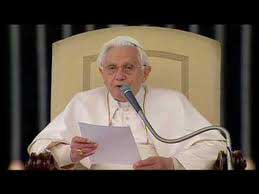


 raise the
raise the 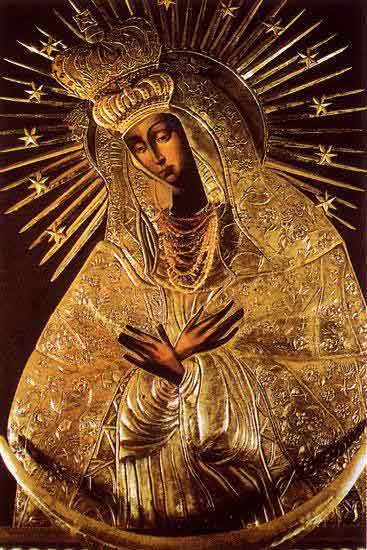
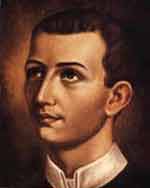





 hy, O
hy, O 